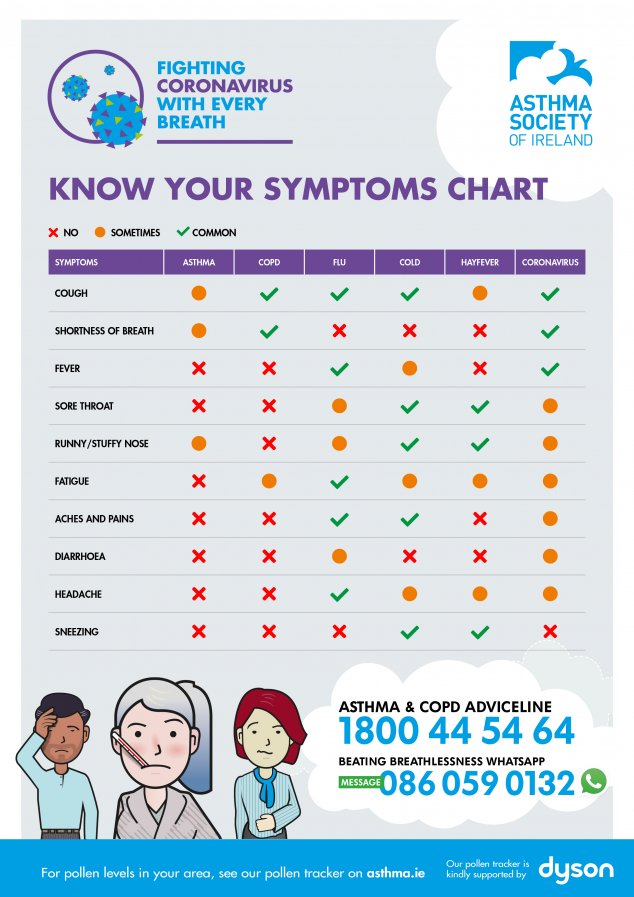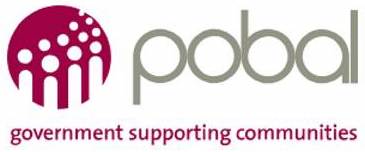Hayfever vs Coronavirus Symptoms
The Asthma Society of Ireland is today officially launching its annual Hayfever Campaign for the 304,000 people who have both asthma and hayfever in Ireland. The Asthma Society’s Hayfever Campaign includes the Pollen Tracker, kindly supported by Dyson, providing daily updates of pollen levels across the four provinces, and also predictions of pollen levels for the following day. The Asthma Society is encouraging people with hayfever to visit the Pollen Tracker page on asthma.ie often, and to ensure their hayfever is well managed this summer.
Sarah O’Connor, CEO of the Asthma Society of Ireland, said: “For the majority of people who have hayfever, they may describe the condition as being annoying but would usually not described it as life-threatening. However, for the 376,000 people who have asthma and hayfever, unmanaged hayfever can be just that. Hayfever symptoms are capable of causing an asthma symptoms to escalate into a serious asthma attack, which in some case can be fatal. One person dies every week in Ireland from asthma.
People with asthma need to ensure their hayfever is well managed throughout “Pollen Season” which runs from now until September. Our Pollen Tracker on asthma.ie will allow people recognise the days that require additional precautions for managing their hayfever. For the 80% of people with asthma who also have hayfever, they should visit our Pollen Tracker daily. This page also has some great top tips for surviving hayfever season.”
During the current coronavirus pandemic, it is extremely important that people with asthma can distinguish between coronavirus and hayfever symptoms. The Asthma Society has been working with its medical advisory group to create a Know Your Symptoms Chart which will allow people with asthma and COPD to recognise if their symptoms point to hayfever or to coronavirus. This resources is available on asthma.ie.
Dr. Dermot Nolan, ICGP Asthma Lead and member of the Asthma Society’s Medical Advisory Group, said: “As we come into hayfever season, it’s important to know the crossovers between hayfever, asthma and coronavirus symptoms, but also to have help differentiating symptoms between the three. The Asthma Society’s graphic, launched today as part of the Hayfever Campaign, clearly outlines what symptoms are strongly or occasionally association with COVID-19, hayfever, asthma and COPD, to help support patients as they seek to learn more.
Common COVID-19 symptoms include feeling unwell, a temperature, a slight shortness of breath, or a persistent cough. The common symptoms of hayfever are: itchy eyes, itchy throat and a running nose. The loss of smell and loss of taste, which are symptoms of the start of the new coronavirus, can also be a symptom of hayfever.
There are also noticeable differences between COVID-19 and hayfever symptoms. For example, the COVID-19 cough is persistent, while a hayfever cough tends to occur at night-time. Hayfever sufferers don’t usually feel unwell or tired, but these are common symptoms of COVID-19. People with hayfever, although they have symptoms, they tend not to feel particularly unwell. When a patient has COVID-19, they usually are unwell and they tend to feel flu-like aches, pains or chills in their body, which is not typical of hayfever. Many people have also identified tiredness as a feature of COVID-19. The tiredness that hayfever sufferers experience is related to patients taking certain antihistamines and not the condition itself.”
The hints and tips around hayfever and asthma management include:
- Keep an eye daily on the Asthma Society’s pollen tracker on asthma.ie
- Speak to a nurse on the Asthma Society’s free Asthma and COPD Adviceline (1800 44 54 64) about putting a hayfever management plan in place
- Use the Asthma Society’s new Beating Breathlessness WhatsApp Patient Support service for any questions on asthma, COPD, coronavirus or hayfever
- Talk to doctor or pharmacist NOW about taking medication to prevent / reduce symptoms. Don't wait until you feel unwell
- Keep windows shut in your bedroom at night
- Keep windows and doors closed when the pollen count is high
- Stay indoors as much as possible on high pollen days
- Stay away from grassy areas, especially when grass is freshly cut
- Put Vaseline around your nostrils to trap pollen
- Wear wraparound sunglasses to stop pollen getting into your eyes
- Shower, wash your hair and change your clothes if you have been outside for an extended period of time
- Avoid drying clothes outdoors, or shake them outdoors before bringing them in
- Minimise your contact with pets that have been outdoors and are likely to be carrying pollen
If people with asthma or COPD have any questions in relation to symptoms they are experiencing, they can use the Asthma Society’s new Beating Breathlessness WhatsApp patient support service which allows people to message a respiratory specialist nurse to get support, advice and information about asthma, COPD, coronavirus and hayfever. This free WhatsApp service is available on 086 059 0132.
People who would prefer to speak to a nurse can call the Asthma Society’s free Joint Asthma and COPD Adviceline on 1800 44 54 64.

Our Pollen Tracker is now live and shows pollen levels across the four provinces.


